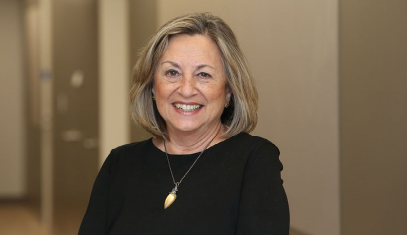A Leader in Her Field
Sandra Weintraub, PhD, has always followed her passion. Now she’s a leader in the field of clinical neuropsychology, which did not exist as a distinct discipline when she started in academia. She began her career with an interest in aphasia — an acquired language disorder that affects a person's ability to communicate — and worked as a research assistant at the Boston Aphasia Research Center. As a research assistant, she worked on the Boston Naming Test, which is now one of the most common diagnostic tests for individuals with language challenges.
 Weintraub was always fascinated with how the brain works. Even though there was no prescribed career path for her at the time, she kept following her interests. None of the graduate programs available at the time emphasized clinical neuropsychological clinical training. She decided to go to Boston University to pursue her PhD in Developmental Psychology and worked closely with Jean Gleason, who has made fundamental contributions to the understanding of language acquisition in aphasia.
Weintraub was always fascinated with how the brain works. Even though there was no prescribed career path for her at the time, she kept following her interests. None of the graduate programs available at the time emphasized clinical neuropsychological clinical training. She decided to go to Boston University to pursue her PhD in Developmental Psychology and worked closely with Jean Gleason, who has made fundamental contributions to the understanding of language acquisition in aphasia.
Prior to the 1980s, Weintraub noted, there were a lot of people calling themselves neuropsychologists, but there was no established professional discipline.
“There were a lot of women like me who came to neuropsychology from different avenues,” Weintraub said. It wasn’t until 1997 when a group of professionals got together to develop credentialing criteria, now known as the Houston Guidelines, for training in clinical neuropsychology.
With guidelines in place, there was now a clearer path for individuals to pursue careers in neuropsychology. Weintraub became involved in training other clinicians to help develop the neuropsychology field.
In 2013, Weintraub was elected president of the International Neuropsychological Society (INS) in recognition of her research and clinical accomplishments in clinical neuropsychology. She enjoys her role as a leader in the field, and is gratified when she sees what those she trained have achieved.
As in many industries, academia is often dominated by men. Weintraub shared her advice to other women scientists and clinicians.
“Figure out what’s a good balance for you, how much time you want to devote to research and clinical care and what those commitments will require from other parts of your life” she said. “Be honest with yourself and think of what will be most gratifying to you. Talk with women who you admire and respect as you make your career choices.”